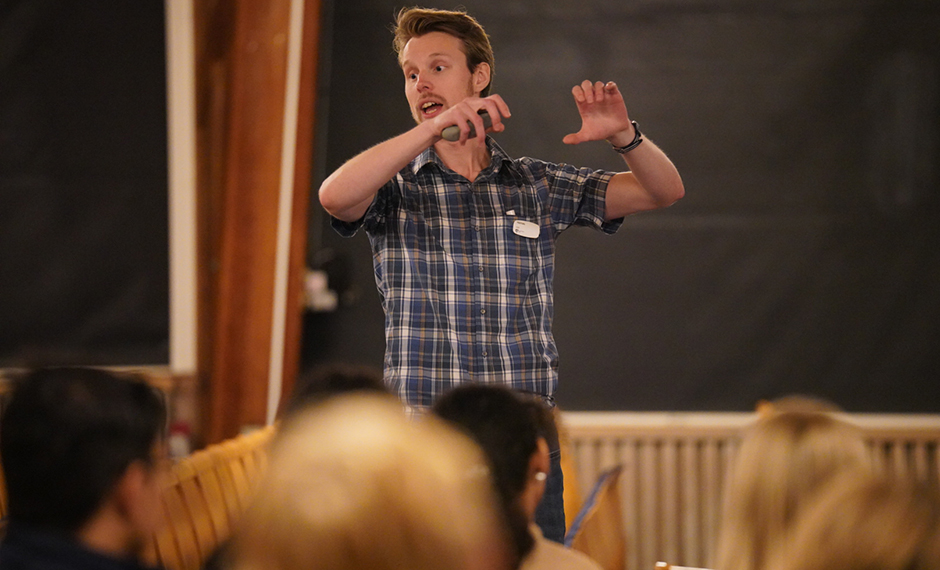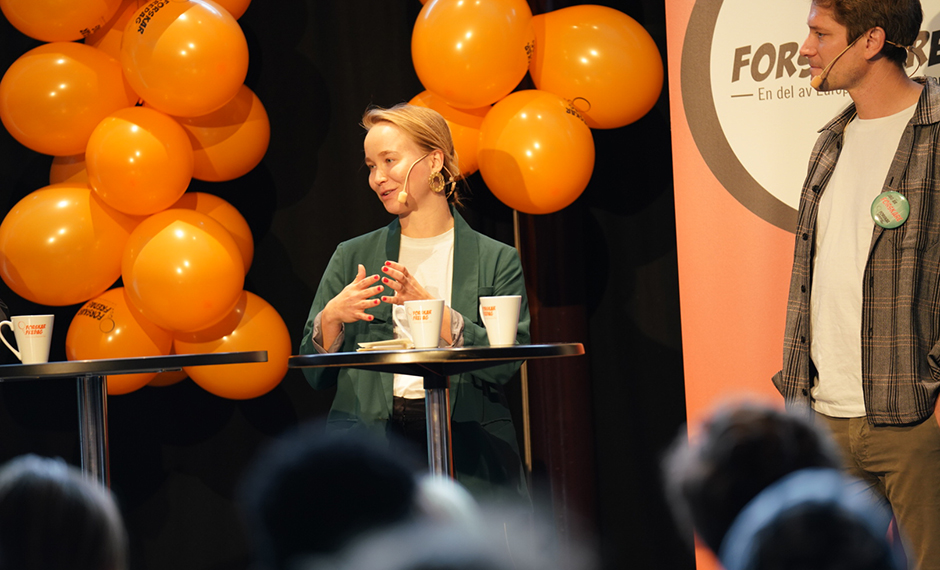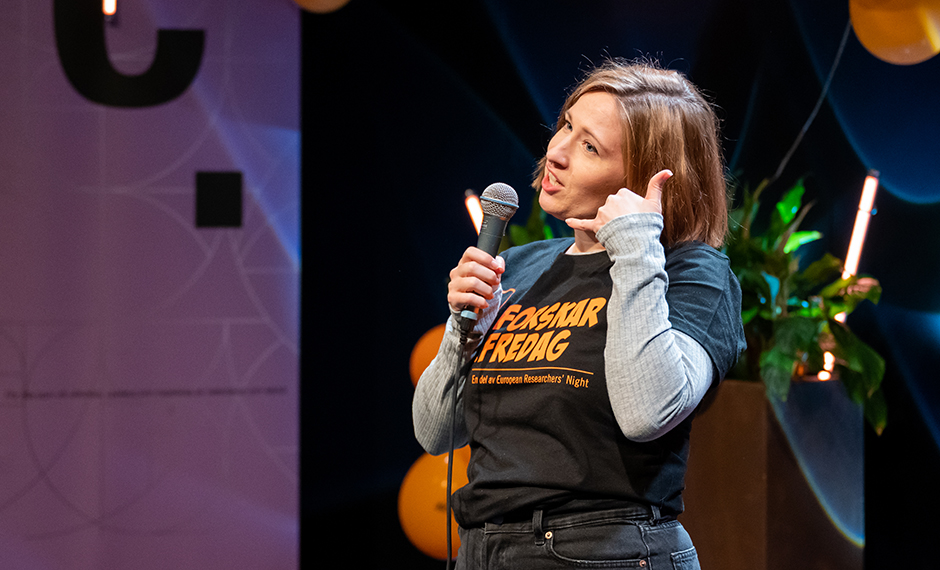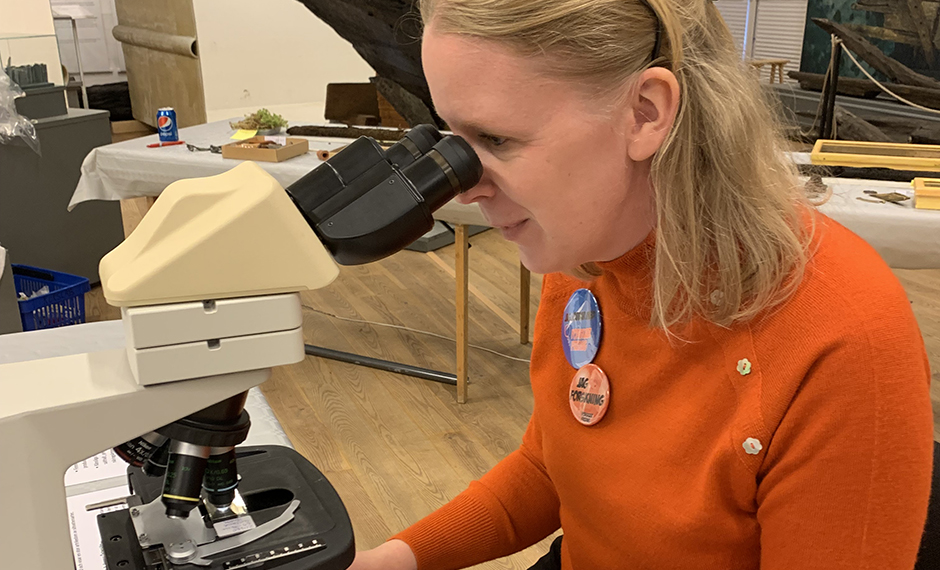Experiments, stand-up comedy, guided lab tours, classroom visits and answering all sorts of questions about research and what life might be like in the future, were some of the activities undertaken by researchers in Sweden as part of European Researchers’ Night. Known as ForskarFredag, the science festival ran from 20-25 September 2021, engaging 350 researchers and around 27,000 participants across the whole of Sweden.

This year’s programme featured a mixture of physical and online activities organised in 25 towns and cities, designed to inspire and engage both young and old. With topics ranging from robots, sport, space and the history of colour, to forests, food, biodiversity and the climate, activities were designed to highlight the diversity of research and how it affects our everyday lives.
Borrow a researcher
For the first time, school classes across the whole of Sweden had the opportunity to ‘borrow a researcher’, either in person or online, to learn more about their research and work as a researcher. A new booking platform developed by the coordinator of ForskarFredag, VA (Public & Science), facilitated the process, with 90 classes taking up the opportunity in 22 locations. Evaluating the experience, one of the pupils commented on how they had “learnt that research can change the world.”
Participants from North to South
Physical events were held in many parts of the country. In Blekinge, Lund, Stenungsund and Umeå, among other places, there was the opportunity to visit the cities’ science centres to look for fossils, watch a science slam, be amazed by a chemistry and physics show or have breakfast with a researcher. At Dalenium in Stenstorp, participants gained insights into the gaming industry from a computer game researcher. Whereas in Västervik, activities around the theme of water covered topics including archeology, earth sciences and climate change, with visitors invited to use microscopes to look for fossil diatoms in bottom sediments from lakes and seas.
Focus on the climate
The overall theme for 2021 was ‘what will life be like in the future?’, with many activities involving discussions about societal challenges such as climate change and sustainability. An online event broadcast from Norrköping, looked at how our lives might change due to climate change from a number of different research perspectives. Speakers included Lena Lindström from the Swedish Meteorological and Hydrological Institute and national contact point for the UN’s climate panel IPCC, who talked about findings from the latest IPCC report. Maria Nyström, a Professor at Chalmers University of Technology also explained how space research can be used to find climate solutions back on earth.
The climate was the focus of a dialogue event on “Our shared future” held in Stockholm at which young people could ask questions about climate change directly to researchers and policy makers. The experts answering the young people’s questions were Jytte Guteland, a member of the European Parliament, Professor Joacim Rocklöv, an epidemiologist and modeller studying the impacts of climate change on health at Umeå University, and Johan Kuylenstierna, Chair of the Swedish Climate Policy Council, plus representatives from the youth organisation Regeneration 2030. Participants learnt what the Swedish government is doing to tackle climate change, the importance of reducing over consumption and how the European Green Deal is seeking to make a difference.

Adventure and laughter online
Many online activities were also on offer and open to anyone to participate in. On the Friday evening, the Natural History Museum in Stockholm organised a ‘hunt for the missing researchers’, an exciting one-hour adventure broadcast via YouTube. Around 9,000 people followed Youtuber Daniel Norberg on an adventure around the museum after hours, in which they helped him to solve clues to track down three missing researchers. Once found, the researchers answered questions from the audience, including on how to become a researcher.
In Umeå, five brave researchers took to the stage to entertain audiences about themselves and their research in a stand-up comedy event that raised lots of laughs on subjects including molecular biology and tree fungi. Held in English, the broadcast event was available to watch online.
Other online activities include a panel debate on source criticism and the distinction between facts and opinions, organised by House of Science in Stockholm, a lunch with researchers from Dalarna at which ways to make our cities more sustainable was explored, and a discussion about the use of robots in our daily lives from Skövde.

Investigating the accessibility of housing through citizen science
Each year, ForskarFredag also runs a citizen science project whereby school pupils and members of the public get to help researchers carry out real research. In this year’s Housing Experiment, school pupils, senior citizens and others have been helping researchers at Lund University to measure the accessibility of Swedish housing. Data collection continues until the end of October, when it will then be analysed by researchers and the findings published.
To further promote the European dimension of Researchers’ Night, ForskarFredag has also been collaborating with Researchers’ Night events in other countries. Collaborative activities included a series of “Meet the researcher” videos, a 48hr Europe-wide Bioblitz and an online science café on the future of European cities featuring researchers from four different countries, led by VA.
ForskarFredag is coordinated by the non-profit Swedish organisation VA (Public & Science) and organised locally by universities, science centres, museums, municipalities, regions and authorities in 25 towns and cities in Sweden. This year, 27,000 people from 70% of Sweden’s municipalities took up the opportunity to discover how ‘researchers are ordinary people with extraordinary jobs’. In 2021, European Researchers’ Night was run in 29 countries across Europe.
European Researchers’ Night in Sweden is funded by the European Commission under HORIZON 2020 in the framework of the Marie Sklodowska Curie actions, GA 101036119, together with our Swedish partners

